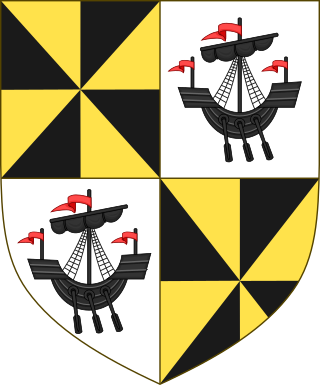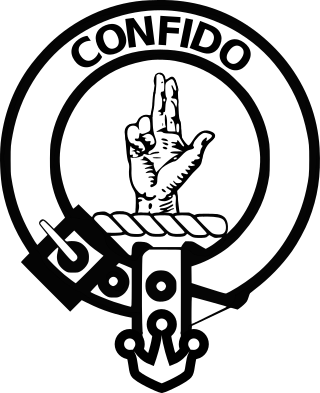Related Research Articles
James Hamilton, 1st Earl of AbercornPC (S) (1575–1618) was a Scottish diplomat for James VI and an undertaker in the Plantation of Ulster, Ireland.

Duke of Hamilton is a title in the Peerage of Scotland, created in April 1643. It is the senior dukedom in that peerage, and as such its holder is the premier peer of Scotland, as well as being head of both the House of Hamilton and the House of Douglas. The title, the town of Hamilton in Lanarkshire, and many places around the world are named after members of the Hamilton family. The ducal family's surname, originally "Hamilton", is now "Douglas-Hamilton". Since 1711, the dukedom has been held together with the Dukedom of Brandon in the Peerage of Great Britain, and the dukes since that time have been styled Duke of Hamilton and Brandon, along with several other subsidiary titles.

Colin Campbell, 1st Earl of Argyll was a medieval Scottish nobleman, peer, and politician. He was the son of Archibald Campbell, Master of Campbell and Elizabeth Somerville, daughter of John Somerville, 3rd Lord Somerville. He had the sobriquet Colin Mulle, Bold Earl Colin.

James Douglas, the 4th Lord of Dalkeith, was created the 1st Earl of Morton in 1458.

Earl of Kilmarnock was a title created twice in the Peerage of Scotland for the Boyd family. It was first created in 1454 for Robert Boyd, Great Chamberlain of Scotland. It was created a second time in 1661 for William Boyd, 10th Lord Boyd. Both titles were forfeited in 1746.
Thomas Boyd, Earl of Arran was a Scottish nobleman.
Robert Boyd, 4th Lord Boyd was a Scottish nobleman who supported various factions attempting to dominate Scottish politics during the reign of King James V and the minority of Mary, Queen of Scots.
Robert Boyd, 5th Lord Boyd was a Scottish noble and courtier.

Claud Hamilton, 1st Lord Paisley was a Scottish nobleman who fought at the Battle of Langside in 1568 for Mary, Queen of Scots. He is the ancestor of the earls, marquesses and dukes of Abercorn.

Clan Boyd is a Scottish clan of the Scottish Lowlands and is recognized as such by the Lord Lyon King of Arms.
James Hamilton, 2nd Earl of Abercorn was a Catholic Scottish nobleman. He, his wife, his mother, and most of his family were persecuted by the kirk as recusants. Implementing his father's will, he gave his Irish title of Baron Hamilton of Strabane to his younger brother Claud. His younger brothers inherited his father's Irish lands, while he received the Scottish ones, which he squandered away, being deep in debt in his later days.
James Boyd 2nd Lord Boyd was a Scottish peer. He was the grandson and heir of Robert Boyd, 1st Lord Boyd. His parents were Thomas Boyd, Earl of Arran, and Mary, eldest daughter of King James II. His father Thomas was the eldest son of the 1st Lord Boyd, but died in about 1472 while his father still lived.
David Kennedy, 3rd Lord Kennedy and 1st Earl of Cassilis was a Scottish peer, the son of John Kennedy, 2nd Lord Kennedy. He was born about 1463, in Maybole, Ayrshire, Scotland. He was a Privy Councillor of King James IV and was created Earl of Cassilis by him in 1502. Killed at the Battle of Flodden, on 9 September 1513.
Alexander Boyd, 3rd Lord Boyd was a Scottish noble.
Thomas Boyd, 6th Lord Boyd (c. 1547–1611) was a Scottish noble and politician.
Robert Boyd, 7th Lord Boyd, was a Scottish noble.
Robert Boyd, 8th Lord Boyd, was a Scottish noble and politician.
James Boyd, 9th Lord Boyd (–1654), was a Scottish noble who adhered to the Royalist cause during the Wars of the Three Kingdoms.

The Lands of Pitcon, previously Potconnel now form a small estate of around 100 acres in the Parish of Dalry, North Ayrshire in the old Barony of Dalry. The present category B listed Georgian mansion house dating from 1787, replaces an older castellated dwelling. Pitcon lies on the outskirts of Drakemyres, now a suburb of Dalry, close to the confluence of the Rye Water, River Garnock, and the Mains Burn, standing on a low knoll. Such a marshy area would have provided a degree of protection to the old castle.

Sir Edward Keith was a Scottish nobleman and hereditary 11th Marischal of Scotland.
References
- 1 2 3 4 5 Chisholm 1911, p. 353.
- 1 2 3 4 5 Cokayne 1912, p. 260.
- ↑ Paul, James Balfour, ed., The Register of the Great Seal of Scotland A.D. 1424–1513, Edinburgh (1882), p. 126
- ↑ Shaw, M.S., W.S., Ed., Some Family Papers of the Hunters of Hunterston, Edinburgh (1925), pp. 3-4
- ↑ MacDougall, Norman James III Revised edition John Donald Edinburgh 2009
- 1 2 Balfour 1904, pp. 145, 146.
Attribution:
- This article incorporates text from a publication now in the public domain : Chisholm, Hugh, ed. (1911). "Boyd, Robert Boyd, Lord". Encyclopædia Britannica . Vol. 3 (11th ed.). Cambridge University Press. pp. 353–354.
 This article incorporates text from this source, which is in the public domain :Cokayne, George Edward, ed. (1912). Complete peerage of England, Scotland, Ireland, Great Britain and the United Kingdom, extant, extinct or dormant (Bass to Canning). Vol. 2. London: The St. Catherine Press, ltd. pp. 260, 261.
This article incorporates text from this source, which is in the public domain :Cokayne, George Edward, ed. (1912). Complete peerage of England, Scotland, Ireland, Great Britain and the United Kingdom, extant, extinct or dormant (Bass to Canning). Vol. 2. London: The St. Catherine Press, ltd. pp. 260, 261. This article incorporates text from this source, which is in the public domain :Balfour, Paul, James (1904). The Scots Peerage; founded on Wood's edition of Sir Robert Douglas's peerage of Scotland; containing an historical and genealogical account of the nobility of that kingdom. Vol. 5. Edinburgh: D. Douglas. pp. 145, 146.
This article incorporates text from this source, which is in the public domain :Balfour, Paul, James (1904). The Scots Peerage; founded on Wood's edition of Sir Robert Douglas's peerage of Scotland; containing an historical and genealogical account of the nobility of that kingdom. Vol. 5. Edinburgh: D. Douglas. pp. 145, 146.